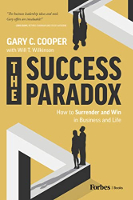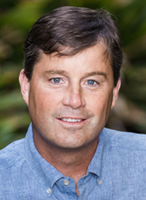Image by Mariana Anatoneag
By all the usual measurements, I was successful and living the American dream at full speed. I owned companies with revenues in the $30 to $50 million range before I turned thirty. I became highly skilled at buying, building, and selling businesses. I focused on helping people and creating social as well as financial profit. But my success came at a great cost to my health and relationships and accelerated toward one moment and one choice: change or die.
I’ve mused for years on how the miracle that saved me also inspired me to do a total 180, to defy decades of “proven” business practices and discover, develop, and finally write about what I’ve come to call the Success Paradox.
The Paradox: Surrender and Win
Surrender and win ... that’s a paradox. It’s also my proven experience. But back in the day, I was fiercely competitive. If you’d floated this idea back then, I would have laughed out loud. Surrender? That’s for losers! And I hated the idea of losing.
I was your typical hard-driving CEO. But living in South Carolina, I was also “charming.” You may know the drill: sweet and friendly on the outside, chronically anxious on the inside. There are so many of us like that, driving to succeed the only way we know how. We’re like ducks: everything looks calm above water while underneath we’re paddling away like crazy.
I had a life-changing experience (literally) that turned me around. Now I don’t just believe this paradox, I’m living it. What I call “relaxed productivity” turns out to be incredibly effective and enjoyable.
Mistakes... I've Made A Few
I’ve made more mistakes than most. I’ve failed at many things. I’ve hurt people. I’ve let them down. I’ve been blind, stubborn, arrogant, self-centered, and selfish. I almost died because of health issues I brought on myself through horrible habits, including alcoholism and workaholism.
Today I’m happy, successful, sober, healthy, and wealthy, blessed with a wonderful family, great friends, business partners who love working together, with staff and customers who feel more like family. How did I get from A to B? What can you learn from my journey to empower your own without falling as far as I did? That’s what the Success Paradox is about. If this sounds a little heavy, don’t worry, y’all. I’m just a southern redneck at heart, and this story has a happy ending!
Letting Go
What you’re reading is a product of letting go.
For starters, I had to let the dream of this book go. Two years passed before it came back. The old me would have worked harder and forced it to happen ASAP, I would have made mistakes, and the book would have been a failure. I probably would have hurt people along the way as well. Instead, I let it go. When the timing was right, the perfect publisher, Forbes Books, and my dream writing partner, Will T. Wilkinson, magically showed up.
When I let go of what I am,
I become what I might be.
When I let go of what I have,
I receive what I need.
— TAO TE CHING
I enjoy learning the history behind inspirational business books. In Traction, Gino Wickman writes:
“This operating system didn’t hit me like a lightning bolt; I’ve been refining it in the real world for over 20 years. It came through countless real-world hands-on experiences one lesson at a time.”
I’ve been experimenting for decades. I’ve joked that the secret of my success has been to do the exact opposite of what I used to do and what I thought I should do. But that’s exactly what I did. My business strategies fly in the face of many recommended best business practices, but they work. The simple secret: I don’t make it happen; I let it happen.
Introducing The Three Principles
What’s most important to you?
When I ask audiences this question, I hear everything from caring for my family to following my passion, making a positive difference in the world, fulfilling my potential, helping those in need, being successful, etc.
What's most important to me now is being myself.
1) BEING AUTHENTIC
Conventional business practices prioritize doing, but I became radically more successful when I did the opposite. My focus on being may seem selfish, small, and narrow minded, but who we are being determines what we do. We create brands for our businesses and, increasingly, personal brands to establish us as an authority in our field. But what about our “signature,” the unique qualities of who we are that are inside the brand? What about the authenticity that’s sometimes missing in a media-manufactured authority figure?
A celebrity CEO who respects himself doesn’t shame his employees, lie about manufacturing practices, or profit from products that harm the planet. A government official at peace with herself doesn’t vote in laws that sabotage her constituents, just to pocket a bribe or get reelected. And when someone harms another person, it’s a sure sign they aren’t right within themselves. A teenager with healthy self-esteem doesn’t fire an AK-47 at his classmates or commit suicide.
People who love and respect themselves will love and respect others. People who don’t know who they are, who are conflicted, unhappy, and frustrated but place the blame outside themselves, may not even notice or care about the suffering of others, let alone be motivated to help them.
People who love themselves come across as very loving,
generous, and kind; they express their self-confidence
through humility, forgiveness, and inclusiveness.
— SANAYA ROMAN
I’m not a philosopher. Business has been my life. This is where I’ve succeeded and failed, celebrated my wins and grown from my losses, wrestled with my addictions, done my soul searching, and learned how to be more authentic. I’ve learned that:
Every addiction is an attempt to fix something on the inside with something from the outside. Changing things on the inside creates a ripple effect outside.
2) DOING GOOD
American architect Buckminster Fuller called that ripple effect precession. “One of Bucky’s favorite stories regarding precession was the story of the honey-bee. Seemingly inadvertently, the honey-bee goes about his business of gathering honey. Precessionally, at ninety degrees to his body and his flight path, his legs gather pollen from one flower and ‘accidentally’ take this pollen to the next flower, resulting in cross pollination.
The outcome of this seemingly inadvertent accidental activity is that the bee contributes enormously to life on earth. Of the 100 crop species that provide 90 per cent of the world’s food, over 70 are pollinated by bees.”
Bees intend to make honey; we intend to make money. If bees inadvertently help produce most of our food (how cool is that?!), we can enrich the lives of all those we have daily interactions with. If we are authentic. That’s some “side effect!” I call this “doing good!”
No one is useless in this world
Who lightens the burdens of another.
? CHARLES DICKENS
Most of us are familiar with an old Chinese saying:
“If you want happiness for an hour, take a nap.
If you want happiness for a day, go fishing.
If you want happiness for a year, inherit a fortune.
If you want happiness for a lifetime, help somebody.”
All my businesses have been about helping others. My father was a great example of prioritizing service, and I do the same. I simply don’t consider buying and building a business unless it offers real, not just perceived, value for customers. Building on the foundation he built, we’ve done our best to make a big company feel small, to retain the family feeling that’s so attractive about mom-and-pop operations. Now we’re proving that “relaxed productivity” keeps us healthy as we succeed.
3) DOING WELL
The third component in the formula is doing well. No one stays in business long if they don’t turn a profit. Profit making only becomes problematic when it eclipses everything else.
There’s a fever that comes with wealth, especially sudden riches, and it’s seldom healthy. That fever burned hot in me, and money couldn’t cool those flames. No matter how much I made, it was never enough.
Its ’ April 20, 2011, and I’m at the bar in Bistro 217 in my hometown of Pawleys Island, South Carolina, hanging with my business partners and colleagues. We’re celebrating the sale of a business, one that I started soon after my dad passed away. We’d grown it to ten locations and $20 million in revenue over four years and just sold it for $20 million. Anyone doing business would call this a big success.
The real shock is how depressed I am.
I’m barely in the room. I’m lost in my head, already chasing something bigger, better, and shinier. I’m living in a waking nightmare, running after a moving train I can never catch. The money and the drinks are flowing, everyone is laughing, and there I am, feeling like the loneliest man in the world in the happiest place on earth. Have you ever felt like that, alone in a room full of people, the only one not enjoying himself? Its’ such a terribly familiar feeling for me.
I’m imprisoned in a loneliness of my own making, trying to fix my insides by changing the outside, comparing myself to others, and always coming up short. So I pretend to be OK, I have a few more drinks, and I throw myself back into work. Whats’ next? How can I risk even more money and more of my health to catch that train?
The sanctity of profiteering is often justified by referencing Adam Smith, the so-called father of laissez-faire capitalism. But Smith has been radically misunderstood. As Deborah Boucoyannis, assistant professor at the Woodrow Wilson Department of Politics at the University of Virginia, clarifies: “The key principles of Smith’s system work against the concentration of wealth—they also speak to the top issues in economic policy today: profits, taxes, and the minimum wage. First, Smith thought high profits denoted economic pathology. The rate of profit, he said, was ‘always highest in the countries which are going fastest to ruin.’”
Compensation for CEOs is now 278 times greater than
for ordinary workers. That's a stratospherically larger
income gap than the 20-to-1 ratio in 1965.
— DAVID LAZARUS
Profits are essential to growth and to personal, corporate, and cultural health. But accumulation isn’t the primary measurement of true success. Profits honorably generated by providing actual value can be shared equitably rather than hoarded. I call this “doing well.”
The Success Paradox Lifestyle
The Success Paradox Lifestyle (SPL) applies to the whole of our lives, not just business. It operates according to the three principles we just explored:
- Being Authentic
- Doing Good
- Doing Well
I rank being authentic first because I know from experience that it must come first. “Success” was shallow for me until I began living as my authentic self. Shakespeare wrote, “To thine own self be true.” Henry David Thoreau wrote, “Be yourself—not your idea of what you think somebody else’s idea of yourself should be.” Michael Jordan said, “Authenticity is about being true to who you are, even when everyone around you wants you to be someone else.” Oscar Wilde said, “Be yourself, everyone else is taken.”
When we know ourselves, we are naturally called to help others, and we will become financially successful. We may or may not live large lives, we may or may not create millions or billions in wealth, but we will contribute to the well-being of others, and we will have enough.
When our authenticity flows through everything we do,
we are helping others and generating abundance to share.
I simplified this even further: BE, DO, SHARE.
The Success Paradox is about being successful, not becoming successful. (bold emphasis by InnerSelf.com)
I’ve succeeded in business and life by doing the opposite of what business schools teach: taking more time to rest, being a servant rather than a boss, listening rather than hogging the microphone, giving people options rather than ultimatums, etc. Everything I discovered and began practicing since my big turnaround has made me happier and made our companies more successful.
Copyright ©2023. All Rights Reserved.
Adapted with permission.
Publisher: Forbes Books.
Article Source: The Success Paradox
The Success Paradox: How to Surrender & Win in Business and in Life
by Gary C. Cooper. The Success Paradox is the improbable story of a life and business transformed, told in a warmly authentic style that says: “I hit rock bottom, I surrendered, I began doing the opposite of what I’d been doing before, miracles happened, and here’s what you can learn from my journey.”
The Success Paradox is the improbable story of a life and business transformed, told in a warmly authentic style that says: “I hit rock bottom, I surrendered, I began doing the opposite of what I’d been doing before, miracles happened, and here’s what you can learn from my journey.”
With riveting personal details that illuminate his discoveries, Gary details how he defied the odds – not just to survive but to thrive - by implementing a series of paradoxical strategies, fundamentally opposite to anything he’d ever done before. The result is an inspiring book about what happened to him and a blueprint for readers to experience how to surrender and win in business and life.
Click here for more info and/or to order this hardback book. Also available as a Kindle edition and as an Audiobook.
About the Author
 GARY C. COOPER was 28 when his father died suddenly, making him CEO of a South Carolina health care business with 500 employees, $25M in revenue, and ten partners much older than him. Two months after his father’s funeral the bank called all their loans, demanding $30M in 30 days. So began Gary’s roller coaster ride into workaholism, alcoholism, near bankruptcy, and family strife, culminating in a doctor’s grim diagnosis: “You have less than a month to live.”
GARY C. COOPER was 28 when his father died suddenly, making him CEO of a South Carolina health care business with 500 employees, $25M in revenue, and ten partners much older than him. Two months after his father’s funeral the bank called all their loans, demanding $30M in 30 days. So began Gary’s roller coaster ride into workaholism, alcoholism, near bankruptcy, and family strife, culminating in a doctor’s grim diagnosis: “You have less than a month to live.”
But Gary turned everything around. Today he is sober, healthy, happy, his family is reunited, and his company, Palmetto Infusion Inc., is valued at $400M. How he did it reveals three astounding secrets that turn best business practices upside down.
For more info about Gary, visit garyccooper.com. For info on the non-profit organization he co-founded with Will Wilkinson, visit OpenMindFitnessFoundation.org

























